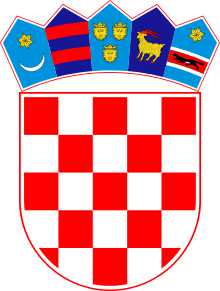Telecommunications in Croatia
Telecommunications in Croatia covers fixed and mobile telephones, radio, television, and the Internet.
Telephones
- Main lines in use: 1.9 million (2009).
- Mobile cellular: 6.0 million (2009).
- Mobile operators:
- Hrvatski Telekom (prefixes +38598, +38599; GSM 900 MHz and 1800 MHz, UMTS 2100 MHz and 900 MHz, LTE 800 MHz and 1800 MHz, 2,273,000 users as at December 2018[1])
- A1 Hrvatska (prefix +38591; GSM 900 MHz and 1800 MHz, UMTS 2100 MHz and 900 MHz, LTE 800 MHz, 1800 MHz and 2600 MHz, 2,100,000 users)[2]
- Tele2 (prefix +38595; GSM 1800 MHz, UMTS 2100 MHz and 900 MHz, 897,000 users at the end of 2018[3])
- Mobile virtual network operator:
- bonbon (prefix +385977 and +385976; uses Hrvatski Telekom's network)
- Tomato (prefix +38592; uses A1 Hrvatska's network)
- Telephone system (2015):
- domestic:
- all local lines are digital;
- main operator: Hrvatski Telekom (owned by Deutsche Telekom);
- other operators: Amis, B.net, H1 Telekom, Iskon Broadband Telekom, Metronet (owned by A1 Hrvatska[4]), Optima Telekom, Vipnet.
- international:
- country code - +385
- digital international service is provided through the main switch in Zagreb;
- Croatia participates in the Trans-Asia-Europe (TEL) fiber-optic project, which consists of two fiber-optic trunk connections with Slovenia and a fiber-optic trunk line from Rijeka to Split and Dubrovnik;
- Croatia is also investing in ADRIA 1, a joint fiber-optic project with Germany, Albania, and Greece.
- domestic:
Radio and television
- Radio broadcast stations: FM 150 (May 2020).
- Radios: 3.5 million (2006).
- Television free-to-air terrestrial stations: 31 (June 2020).
- Televisions: 3.2 million (2006).
Internet
- Top-level domain: .hr, administered by the Croatian Academic and Research Network (CARNet).[5]
- Internet users:
- Fixed broadband: 909,090 subscriptions, 58th in the world; 20.3% of the population, 48th in the world (2012).[6][8]
- Wireless broadband: 2.3 million subscribers, 60th in the world; 52.3% of the population, 26th in the world (2012).[9]
- Internet hosts: 729,420 hosts, 50th in the world (2012).[5]
- IPv4: 2.0 million addresses allocated, less than 0.05% of the world total, 455.9 addresses per 1000 people (2012).[10][11]
- Internet Service Providers (ISPs): 41 (2006).
gollark: But if you ask "hey, random person, would you be willing to give up some amount of money/resources/etc to stop people dying of malaria", people will just mostly say no.
gollark: If you *ask* someone "hey, random person, would you like people in Africa to not die of malaria", they will obviously say yes. Abstractly speaking, people don't want people elsewhere to die of malaria.
gollark: Capitalism is why we have a massively effective (okay, mostly, some things are bad and need fixing, like intellectual property) economic engine here which can produce tons of stuff people want. But people *do not care* about diverting that to help faraway people they can't see.
gollark: Helping people elsewhere does mean somewhat fewer resources available here, and broadly speaking people do not actually want to make that tradeoff.
gollark: You don't particularly need that. You can just buy a cheaper phone and give charity £400 or something.
See also
References

- "Hrvatski Telekom - Business and Financial Review - Analyst Presentation - Results for the year 2018".
- VIPonline
- "Tele2 Sells Its Croatian Business to United Group". www.total-croatia-news.com. Retrieved 2019-06-04.
- http://www.intellinews.com/telekom-austria-s-vipnet-acquires-controlling-stake-in-croatian-metronet-111833/?source=cee-telecoms-media-it-newswatch
- "Communications: Croatia", World Factbook, U.S. Central Intelligence Agency, 28 January 2014. Retrieved 1 February 2014.
- Calculated using penetration rate and population data from "Countries and Areas Ranked by Population: 2012" Archived 2017-03-29 at the Wayback Machine, Population data, International Programs, U.S. Census Bureau, retrieved 26 June 2013
- "Percentage of Individuals using the Internet 2000-2012", International Telecommunications Union (Geneva), June 2013, retrieved 22 June 2013
- "Fixed (wired)-broadband subscriptions per 100 inhabitants 2012", Dynamic Report, ITU ITC EYE, International Telecommunication Union. Retrieved on 29 June 2013.
- "Active mobile-broadband subscriptions per 100 inhabitants 2012", Dynamic Report, ITU ITC EYE, International Telecommunication Union. Retrieved on 29 June 2013.
- Select Formats Archived 2009-05-13 at the Wayback Machine, Country IP Blocks. Accessed on 2 April 2012. Note: Site is said to be updated daily.
- Population, The World Factbook, United States Central Intelligence Agency. Accessed on 2 April 2012. Note: Data are mostly for 1 July 2012.
External links
This article is issued from Wikipedia. The text is licensed under Creative Commons - Attribution - Sharealike. Additional terms may apply for the media files.
